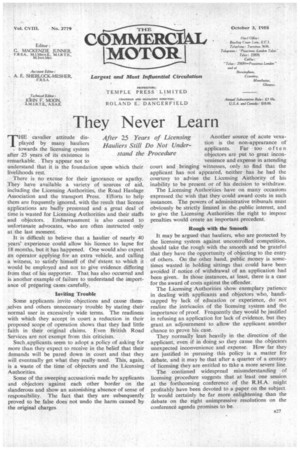They Never Learn
Page 61

If you've noticed an error in this article please click here to report it so we can fix it.
THE cavalier attitude displayed by many. hauliers towards the licensing system after 25 years of its existence is remarkable. They appear not to understand that it is the foundation upon which their livelihoods rest.
There is no excuse for their ignorance or apathy. They have available a variety of sources of aid, including the Licensing Authorities, the Road Haulage Association and the transport Press. Efforts to help them are frequently ignored, with the result that licence applications are badly presented and a great deal of time is wasted for Licensing Authorities and their staffs and objectors. Embarrassment is also caused to unfortunate advocates, who are often instructed only at the last moment.
It is difficult to believe that a haulier of nearly 40 years' experience could allow his licence to lapse for 18 months, but it has happened. One would also expect an operator applying for an extra vehicle, and calling a witness, to satisfy himself of the &tent to which it would be employed and not to give evidence differing from that of his supporter. That has also occurred and is another example of failure to understand the importance of preparing cases carefully.
Inviting Trouble Some applicants invite objections and cause them..selves and others unnecessary trouble by stating their normal user in excessively wide terms. The readiness with which they accept in court a reduction in their proposed scope of operation shows that they had little faith in their original claims. Even British Road Services are not exempt from this criticism.
Such applicants seem to adopt a policy of asking for more than they expect to receive in the belief that their demands will be pared down in court and that they will eventually get what they really need. This, again, is a waste of the time of objectors and the Licensing Authorities.
Some of the sweeping accusations made by applicants and objectors against each other border on the slanderous and show an astonishing absence of sense of responsibility. The fact that they are subsequently proved to be false does not undo the harm caused by the original charges Another source of acute vexation is the non-appearance of applicants. Far too of ten objectors are put to great inconvenience and expense in attending court and . bringing witnesses, only to find that the applicant has not appeared, neither has he had the courtesy to advise the Licensing Authority of his Inability to be present or of his decision to withdraw.
The Licensing Authorities have on many occasions expressed the wish that they could award costs in such instances. The powers of administrative tribunals must obviously be strictly limited in the-public interest, and to give the Licensing Authorities the right to impose penalties would create an important precedent.
Rough with the Smooth It may be argued that hauliers, who are protected by the licensing system against uncontrolled competition, should take the rough with the smooth and be grateful that they have the opportunity of objecting to the entry of others. On the other hand, public money is sometimes wasted in holding sittings that could have been avoided if notice of withdrawal of an application had been given. In those instances, at least, there is a case for the award of costs against the offender.
The Licensing Authorities show exemplary patience in dealing with applicants and objectors who, handicapped by lack of education or experience, do not realize the _intricacies of the licensing system and the importance of proof. Frequently they would be justified in refusing an application for lack of evidence, but they grant an adjournment to allow the applicant another chance to prove his case.
They normally ,lean heavily in the direction of the applicant, even if in doing so they cause the objectors unexpected inconvenience and expense. How far they • are justified in pursuing this policy is a matter for debate, and it may be that after a quarter of a century of licensing they are entitled to. take a more severe line.
The continued widespread misunderstanding of licensing procedure suggests that at least one session at the forthcoming conference of the R.H.A. might profitably have been devoted to a paper on the subject It would certainly be far more enlightening than the debate on the eight unimpressive resolutions on the conference agenda promises to be.
















































































































































































